| | | OFFLINE | | Post: 14.189 | Registrato il: 28/08/2005
| Utente Gold | |
|
  PASTORAL VISIT TO LEUCA AND BRINDISI, June 14-15, 2008
PASTORAL VISIT TO LEUCA AND BRINDISI, June 14-15, 2008
   Forgive me, but I did not realize I failed to post the rest of the Leuca-Brindisi items here from NEWS ABOUT BENEDICT. Let me do that now because, now the visit to Cagliari is on us....
Forgive me, but I did not realize I failed to post the rest of the Leuca-Brindisi items here from NEWS ABOUT BENEDICT. Let me do that now because, now the visit to Cagliari is on us....
6/15/2008 9:30 PM
TERESA BENEDETTA
Post: 13946
Thanks as ever to Caterina for her prompt videocap montages from the Mass in Brindisi, which I have used here in slightly edited form. Here is a translation of the Holy Father's homily:
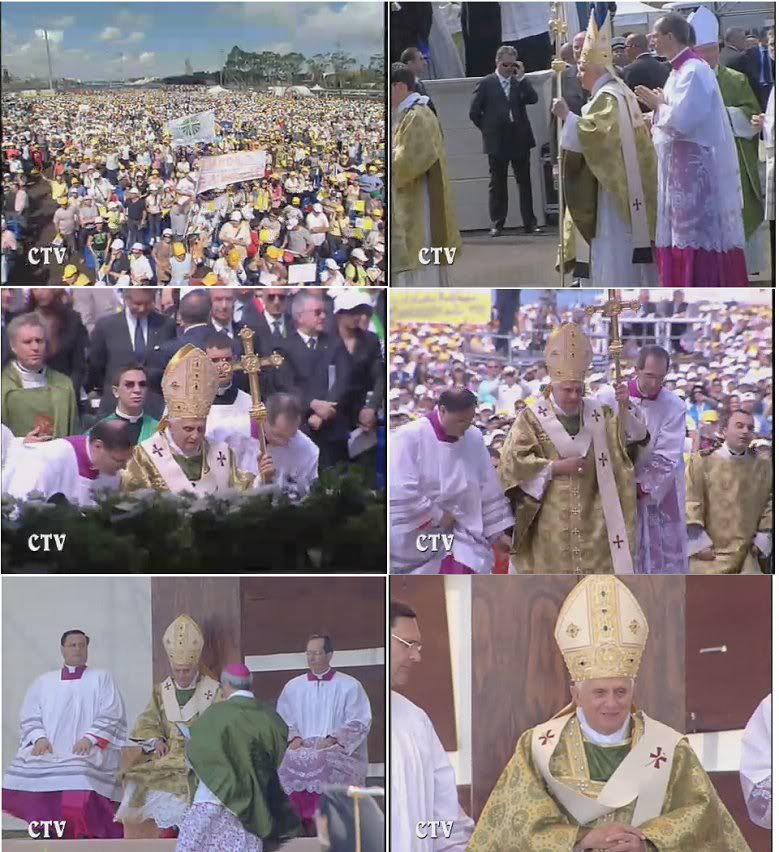
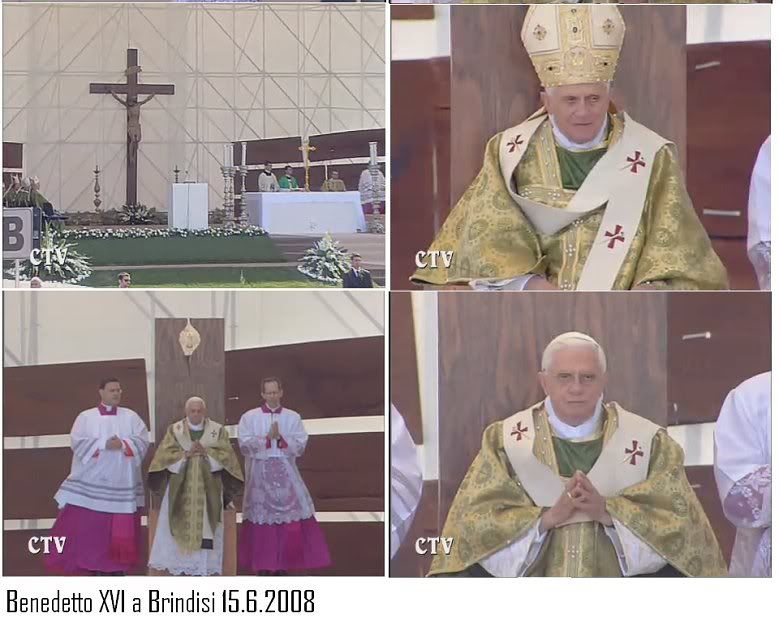
HOMILY AT THE MASS IN BRINDISI, 6/15/08
Dear brothers and sisters,
At the center of my visit to Brindisi, we celebrate on the Lord's day the mystery which is the source and summit of the entire life of the Church.
We celebrate Christ in the Eucharist, the greatest gift from his human and divine heart, the Bread of Life broken and shared so that we may become one with Him and among ourselves.
I greet affectionately all of you who have assembled in this place which is so symbolic - the port - which evokes the missionary voyages of Peter and Paul. With joy I see so many young people who animated last night's vigil, preparing themselves for the Eucharistic celebration. I also greet those of you are taking part spiritually through radio and television.
I address a particular greeting to the pastor of this beloved Church, Mons. Rocco Talucci, thanking him for the words he said at the start of the Mass. I greet the other bishops of Puglia who are here with us in fraternal communion of feelings.
I am particularly happy at the presence of Metropolitan Gennadios, to whom I extend my heartfelt greeting, which also goes to all our Orthodox brothers and those of other confessions, from the Church in Brindisi which, through its ecumenical vocation, invites us to pray and commit ourselves to work for the full unity of all Christians.
I greet and acknowledge the civilian and military authorities who are taking part in this liturgy, wishing them all the best in their service.
My affectionate thoughts go out to the priests and deacons, religious men and women, and all the faithful. I have a special greeting for the patients in the hospitals and those who are in prisons, whom I assure of remembrance in my prayers.
May the grace and peace of the Lord be on everyone and on the whole city of Brindisi!
The Biblical texts, which we heard on this eleventh Sunday in ordinary time, help us to understand the reality of the church: The first Reading (cfr Ex 19,2-6a) evokes anew the alliance reached on Mount Sinai during the exodus from Egypt; the Gospel (cfr Mt 9,26-10,8) tells of the calling and the mission given to the twelve Apostles.
We find presented here the 'constitution' of the Church. How can we not take note the implicit invitation addressed to every community to renew itself in its own vocation and its own missionary impulse?
In the first Reading, the sacred author narrates God's pact with Moses and Israel on Sinai. It is one of the great stages in the history of salvation, one of those moments that transcend history itself, in which the boundary between the Old and New Testaments disappears and the perennial plan of the God of the Alliance reveals itself: the plan to save all men through the sanctification of a people, whom God proposes to make his "special possession, dearer to me than all other people" (Ex 19,5).
In this perspective, the (Jewish) people are called to become 'a holy nation', not only in the moral sense, but first and above all, in its ontological reality itself, in its essence as a people.
How one should understand the identity of this people would be gradually manifested in the course of salvific events that take place in the Old Testament, and is then fully revealed in the coming of Jesus Christ.
Today's Gospel presents us with a decisive moment for that revelation. In fact, when Jesus called twelve apostles, he wanted to refer symbolically to the tribes of Israel, going back to the sons of Jacob.
Thus, placing himself at the center of his new community of Twelve, he made it understood that he had come to bring to fulfillment the plan of the celestial Father, even if it would not be till Pentecost that the new face of the Church would emerge - when the Twelve, 'filled with the Holy Spirit', would proclaim the Gospel, speaking in all languages (acts 2,3-4).
At that time, the universal Church would be manifested, assembled in one Body of which the risen Christ is the Head, and at the same time, sent by him to all nations to the very ends of the earth (cfr Mt 28.20).
The style of Jesus is unmistakable: it is a style characteristic of God who likes to fulfill the greatest things in poor and humble ways. The solemnity of the accounts of the Alliance in the Book of Exodus gives way in the Gospel to humble, discreet gestures which nonetheless contain the enormous potential for renewal.
It is the logic of the Kingdom of God, which is not by chance represented by the small seed that becomes a great tree (cfr Mt 13,31-32).
The Pact of Sinai was accompanied by cosmic signs which terrified the Israelites. But the beginnings of the Church in Galilee were devoid of any such manifestations, reflecting the gentleness and compassion of the heart of Christ, but also pre-announcing another battle - that against the great confusion brought on by the forces of evil.
To the Twelve, as we heard, Christ "gave the power over unclean spirits to drive them out and to cure every disease and every illness" (Mt 10,1). The Twelve would cooperate with Jesus in establishing the Kingdom of God, that is, his beneficial Lordship as the bearer of life - life in abundance for all mankind.
God who is Love triumphs. This work of Christ is always silent - it is not spectacular. It is precisely in the humility of being the Church, of living the Gospel each day, that the great tree of true life grows.
It is with these humble beginnings that the Lord encourages us, so that even with the humility of the Church today, in the poverty of our life, we can see his presence and thus have the courage to walk forward to him, and to make his love present on earth, the love which is the power for peace and for true life.
This then is God's plan: to spread to mankind and the entire cosmos his life-generating love. It is not a spectacular process. It is humble, but it carries with it the power of the future and of history.
It is a plan that God wishes to realize respecting our freedom, because love, by its very nature, cannot be imposed.
The Church is therefore, in Christ, the space for welcoming and mediating the love of God. In this context it appears clearly how the holiness and mission of the Church are two faces of the same coin: only insofar as it is holy - that is, filled with divine love - can the Church fulfill its mission, and it is precisely in the light of this task that God has chosen and sanctified it as his special possession.
Therefore our first duty in helaing this world is to be saintly, conforming ourselves to God. In this way, a sanctifying and transforming force comes from us which can act on others and on history.
It is this pairing of 'holiness-mission' - holiness is always a force which transforms others - against which your ecclesial community, dear brothers and sisters, measures itself at this time, in undertaking its current diocesan Synod.
In this respect, it is useful to reflect that the twelve Apostles were not perfect men who were chosen fro their moral and religious reproachlessness. Yes, they were believers, full of enthusiasm and zeal, but marked at the same time by their human limitations, sometimes even grave ones.
Jesus did not call them because they were already saintly, complete, perfect, but so that they could become saints, so that they could be transformed in order that they themselves could transform history. Exactly as it is for us. And for all Christians.
In the second Reading, we heard it synthesized by the Apostle Paul:
"God proves his love for us in that while we were still sinners Christ died for us." (Rm 5,8). The Church is a community of sinners who believe in the love of God and allow themselves to be transformed by him, and thus by becoming saintly themselves, they sanctify the world.
In the light of this providential Word of God, I have the joy today of confirming the path your Church has taken. It is a path of sanctity and of mission, about which your Archbishop has invited reflection in his recent pastoral letter; it is a path that he has amply verified in the course of his pastoral visits to the parishes and which he now intends to promote through the diocesan Synod.
Today's Gospel suggests to us what the style of mission should be, that is, the interior attitude that must translate into the life we live. It cannot be other than Jesus's own style: that of 'compassion'.
The evangelist proves it, calling attention to how Christ looked at the crowds: "At the sight of the crowds, his heart was moved with pity for them because they were troubled and abandoned, like sheep without a shepherd" (Mt 9,,36).
After having called the Twelve, we find this attitude again in the command he gave them to "go to the lost sheep of the house of Israel" (Mt 10,6). In these statements, one senses Christ's love for his people, especially for the 'little' ones and the poor.
Christian compassion has nothing to do with piousness and volunteerism. Rather, it is synonymous to brotherly solidarity and sharing, and inspired by hope. Were not Jesus's words to the Apostles - "As you go, make this proclamation: 'The kingdom of heaven is at hand'" (Mt 10,7) - born of hope?
This is hope, one that is based on the coming of Christ, and which ultimately coincides with his person and the mystery of the salvation be brought - in which he is the Kingdom of God, and that was news for the world - as recalled in the theme of the fourth National Convention of the Italian Church in Verona: "The risen Christ is the hope of the world."
Inspired by the hope in which you will be saved, even you, brothers and sisters in this ancient Church of Brindisi, are signs and instruments of compassion, of Christ's mercy.
To the Bishop and the priests, I repeat with fervor the words of the divine Teacher: "Cure the sick, raise the dead, cleanse lepers, drive out demons. Without cost you have received; without cost you are to give" (Mt 10,8).
This mandate is addressed even today to you, in the first place. The Spirit which acted in Christ and the Twelve is the same one that works in you and which allows you to fulfill among your people, in this territory, the signs of the Kingdom of love, justice and peace which will come, or rather, already are in the world.
But the mission of Jesus is shared in different ways by all the members of the People of God, by grace of Baptism and Confirmation. I think of the consecrated persons who profess vows of poverty, chastity and obedience. I think of Christian spouses and you, the lay faithful, who are engaged within the ecclesial community and in society as individuals or in associations.
Dear brothers and sisters of Brindisi, follow the path you have undertaken in this spirit. May your patrons, Saint Leucius and Saint Oronzo, who both arrived in the second century from the Orient to irrigate this land with the living water of thr Word of God, continue to watch over you.
May the relics of St. Theodore of Amasea, venerated in the Cathedral of Brindisi, remind you that to give one's life for Christ is the most effective way of preaching.
May St. Lawrence, son of this city who became, in the footsteps of St. Francis, the apostle of peace in a Europe torn by wars and discord, obtain for you the gift of authentic brotherhood.
I entrust you all to the protection of the Blessed Virgin Mary, Mother of hope and Star of evangelization. May the Blessed Virgin help you to remain in the love of Christ so that you may bring others abundant fruits for the glory of God the Father and for the salvation of the world. Amen.
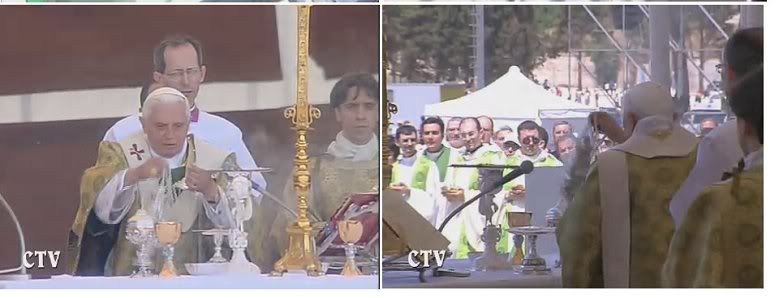
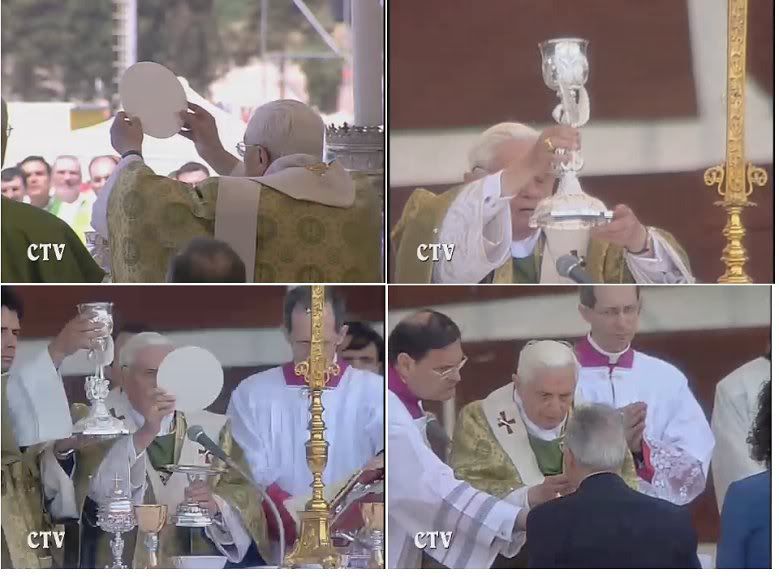
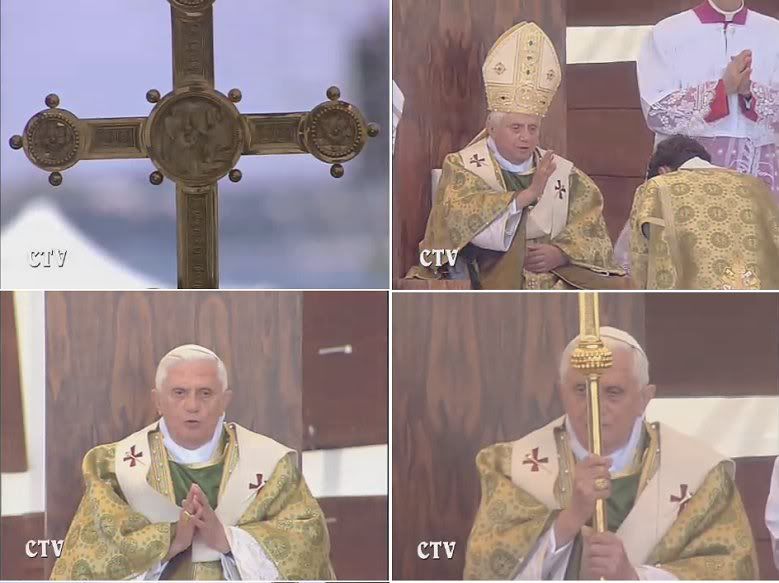
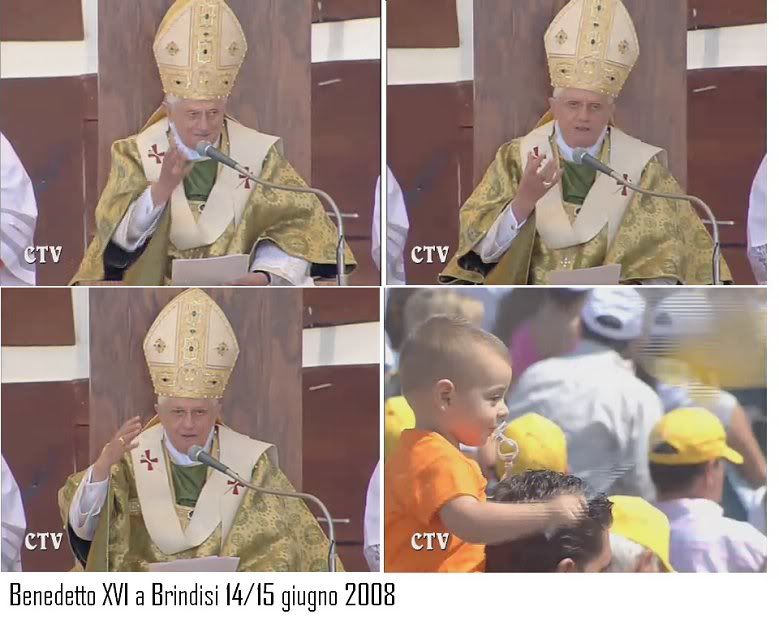
At the conclusion of the Holy Mass celebrated in Sant'Apollinare wharf at the Port of Brindisi, the {ope led in the recitation of the Angelus. Here are the words he said before the prayers:
REMARKS BEFORE THE ANGELUS
Dear brothers and sisters,
Before concluding this celebration, I express my acknowledgment to all those who prepared it with such care, animating it with music and song. I thank all those who organized my trip and are contributing so that everything may proceed in the best way. I refer to the various local authorities, the forces of order, volunteers, and you, dear inhabitants of Brindisi.
I invite everyone now, as I do every Sunday, to join me in praying the Angelus.
The place where we find ourselves - the port - is laden with pregnant symbolic significance. Every port speaks of welcome, of refuge, of security; it represents the hoped-for goal after navigation, perhaps long and difficult. But it also means departures, projects and aspirations, for the future.
In particular, the port of Brindisi has a front-line role in communications towards the Mediterranean world and the Middle East, and because of this, it also hosts a base of the United Nations which carries out an important function on the humanitarian level.
From this very evocative place, not far from a place named 'good morning' (Calimera) in Greek, I wish therefore to renew the Christian message of cooperation and peace among all peoples, especially among those who face the Mediterranean sea, ancient cradle of civilization, and those of the Near and Middle East.
And I am pleased to do so with the words that I used two months ago in New York, addressing the General Assembly of the United Nations: "The action of the international community and its institutions, provided they respect the principles that underlie the international order, should never be interpreted as an undesired imposition and a limitation on sovereignty. On the contrary, it is indifference or non-intervention that bring real damage. What is needed is a more profound search for ways to forestall and control conflicts, exploring every possible diplomatic way and paying attention to the faintest signs of dialog or desire for reconciliation" (L'Osservatore Romano, 4/20/08, O. 8).
From this piece of Europe that juts out into the Mediterranean, between East and West, we turn once again to Mary, the Mother who shows us the way - Odegitria - giving us Jesus, the Way of peace. We invoke her ideally with all the titles with which she is venerated in teh shrines of Puglia, and in particular here, from this ancient port, we pray to her as the 'port of salvation' for every man and for all mankind.
May her maternal protection always defend your city and region, Italy, Europe and the whole world from the tempests that threaten the faith and true values, and may she allow the young generations to set forth without fear to face the journey of life with Christian hope. Mary, port of salvation, pray for us!
After the recitation of the Angelus, the Holy Father left the Port of Brindisi and returned by car to the Bishop's Palace, where he had lunch with the bishops of Puglia.
|